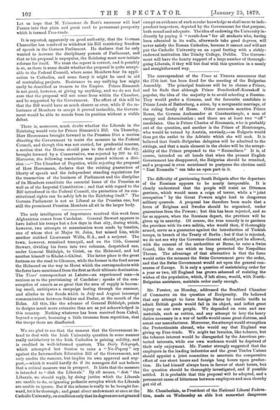Mr. Forster, on Monday, addressed the Bradford Chamber of Commerce
on the question of Reciprocity. lie believed that any attempt to force foreign States by hostile tariffs to admit British goods would fail in its object, and inflict great injury on our own people. We depended on corn and raw materials, such as cotton, and any attempt to levy the heavy duties necessary in a war of tariffs would cause great distress, and arrest our manufactures. Moreover, the attempt would strengthen the Protectionists abroad, who would say that England was giving up Free-trade. We might tax luxuries, like tobacco, but the tobacco interest would be disregarded by the American pro- tected interests, while our own workmen would be deprived of their only enjoyment. Mr. Forster strongly suggested that the employers in the leading industries and the great Trades TJnions should appoint a joint committee to ascertain the comparative effect of our short hours and foreign long hours upon produc- tion. He had himself always been in favour of short hours, but the question should be thoroughly investigated, and if possible settled. It is probable that this proposal will be adopted, and a permanent cause of bitterness between employers and men thereby got rid of.


































 Previous page
Previous page